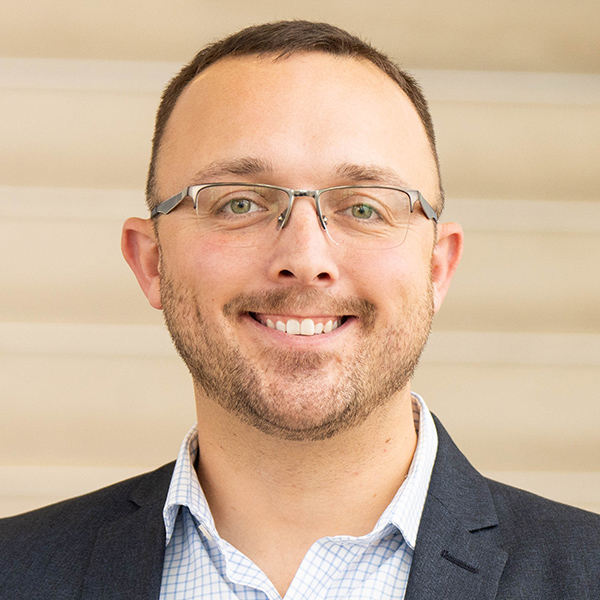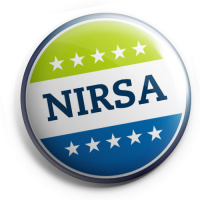Biography
Aaron Mowen serves as the Director of Recreation & Wellness at Grand Valley State University (GVSU). Prior to his role at GVSU, he was the Director of Campus Recreation at Saginaw Valley State University (SVSU) for 15 years. He earned a bachelor’s degree in exercise science from SVSU and a master’s degree in sports administration from Michigan State University. Aaron has been active in NIRSA since 2008 and has presented at state and regional conferences. He served as the 2020 MIRSA State Director, a member of the NIRSA Assembly in 2022, and two-time graduate of the NIRSA School of Collegiate Recreation (2012, 2014).
In addition to his professional roles, Aaron is set to retire after 21 years of service in the United States Marine Corps.
What is your NIRSA “Why”? (What does NIRSA mean to you?)
My NIRSA “Why” is deeply rooted in the sense of community and professional growth that this organization fosters. As an undergraduate, I hadn’t realized that collegiate recreation could be a fulfilling career, or that there were pathways like graduate assistantships, nor how integral NIRSA is in guiding students and professionals alike. For me, NIRSA transcends the realm of collegiate recreation—it’s a commitment to empowering professionals to make meaningful impacts within our institutions, the industry, and each other.
Through NIRSA, I have experienced the profound benefits of collaboration, networking, and leadership development, all of which have shaped my career in invaluable ways. Starting as a new professional from a small program, I leaned heavily on NIRSA colleagues for mentorship and support. People like Greg Jordan, who greeted me at my very first state workshop, and many others who offered encouragement along the way, have been fundamental to my journey.
Now, I feel a strong responsibility to extend that same welcome and support to the next generation of leaders. Being part of NIRSA is about more than individual growth; it’s about contributing to a shared mission of building healthy, engaged communities and empowering future leaders in recreation and wellness. NIRSA embodies a spirit of collective resilience and growth, encouraging each of us to build a legacy that enhances our field and inspires others to carry it forward.
What are the current trends in collegiate recreation and higher education that you see impacting our work and the Association? How would you collaborate with the members in your region and the Member Network team to solve these issues?
Evolving from a focus on intramural sports to becoming a cornerstone of holistic well-being for students and campus communities, NIRSA’s agility remains crucial for making a meaningful impact. Today, several emerging trends are shaping our work, presenting both challenges and opportunities for our Association and its members.
- Mental health and well-being needs have increased with collegiate recreation departments often at the front lines of supporting emotional and social well-being. Recreation programs are expanding offerings beyond physical activity to include mindfulness, social connection, and stress management resources.
- Since the COVID-19 pandemic, there has been a notable increase in outdoor recreation and this trend has largely persisted. Data from the U.S. National Park Service and the Outdoor Industry Association confirm a spike in national park visits and participation in outdoor activities, such as hiking and cycling. Students continue to prioritize outdoor spaces as a vital part of their college experience and research highlights that the pandemic heightened environmental consciousness among younger generations, who increasingly value sustainability in their surroundings and advocate for green spaces on campuses.
- There is a growing demand for flexible work environments and competitive compensation in the workforce. This trend requires us to reevaluate traditional roles and consider how to offer both flexibility and attractive career paths for staff.
- With a developing focus on the return on investment of a college degree, recreation departments are well-positioned to offer meaningful student engagement that fosters job-readiness and life skills. Through leadership opportunities in club sports or employment, students gain valuable experiences that enhance their employability.
NIRSA and the Member Network team strength to addressing these trends is our network of communities. Engaged members proactively serve to address these topics and the Member Network can support by understanding members’ needs and connecting them with NIRSA’s extensive resources, knowledge, and leaders. Sharing insights from Health & Wellbeing Taskforce or the Association of Outdoor Recreation and Education (AORE) can elevate best practices and promote collaboration among members to tackle common challenges.
Utilizing tools like the Institutional Data Set, Salary Survey, and the Council for the Advancement of Standards (CAS) will be vital for informed decision-making at our institutions. These resources provide critical data and standards that can guide our efforts to adapt to the evolving needs of students. By reinforcing the commitment of NIRSA to support its members, we can ensure that collegiate recreation continues to play a crucial role in higher education. The collective strength of our membership will help advance our profession, ensuring we effectively serve our constituents and meet their changing demands.
How has your experience in your state, region, and/or NIRSA prepared you to serve on the Member Network? What unique skills or talents would you bring to the Member Network?
With 16 years of membership and active participation in state and NIRSA events, as well as experience serving as a State Director, on the NIRSA Assembly, and as a graduate of the NIRSA School of Recreation, I’ve gained a deep understanding of NIRSA and the unique needs of our members. These roles have given me the opportunity to engage intentionally with colleagues, understand the diverse perspectives within our community, and contribute meaningfully to NIRSA’s mission. NIRSA serves as a powerful vehicle, connecting our communities in a way that drives knowledge-sharing and supports the needs across our interconnected networks, creating a foundation that strengthens us all.
Relationship-building and a genuine desire to understand others are central to my approach. Listening to our members is essential to me, and I am dedicated to creating spaces where voices are heard, respected, and valued. By fostering these connections and facilitating open dialogue, we can align our efforts with the evolving priorities and aspirations of our community. My goal is to bridge ideas and initiatives that promote growth and ensure that NIRSA remains a resource that empowers every member.



